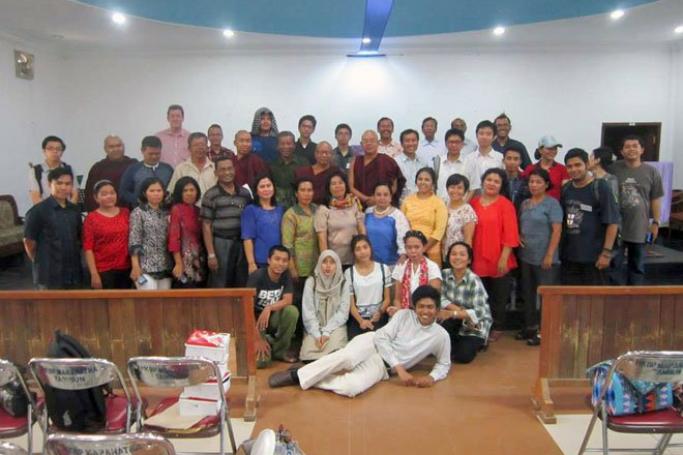“Laughter and honesty are a great way to strengthen relationships, build dialogue and break down barriers, as I have found this week with my friends from different religions from Burma and Indonesia,” said Benedict Rogers, author and activist with Christian Solidarity Worldwide.
The Myanmar-Indonesia Interfaith Exchange held at the end of February, organised by Christian Solidarity Worldwide and the Communion of Churches in Indonesia, brought together Buddhists, Muslims and Christians from Myanmar and Indonesia and civil society activists from both countries.
The participants from Myanmar comprised four monks, including the Venerable Ariya Wun Tha Bhiwun Sa, Abbot of Myawaddy Mingyi Monastery in Mandalay (known as Myawaddy Sayadaw), Venerable Seindida, Abbot of the Asia Alinyang Monastery at Pyin Oo Lwin, and Venerable Ziena, a prominent social media activist monk. The other Myanmar participants included Harry Myo Lin from The Seagull civil society organisation, Khin Thinzar from Smile Education, Kay Thi Oo from the Togetherness Education Network; Khin Maung Myint (Naeem) from Rohingya political party the National Democratic Party for Development, Father Thomas Htang Shan Mong, coordinator of the Justice and Peace Commission of the Catholic Bishops Conference of Myanmar, U Soe Hla, general secretary of the Mandalay Council of Churches, and Oliver Joseph, assistant program secretary at the Myanmar Council of Churches.
“This trip brought us many advantages,” said the Venerable Seindida. “We were able to learn more about the Muslim majority in Indonesia and about religious minorities and had a chance to learn about their situation firsthand. We met many organisations and people working on peace. In particular, we met with Indonesia’s Ministry of Religious Affairs – such a meeting would not be possible in Myanmar,” he said.
Venerable Seindida described as “inspiring” the group’s dialogue with the Forum for Inter-Religious Harmony in Jakarta, which included meeting members of former Indonesian president Abdurrahman Wahid’s family.
“Meeting the Wahid family is very different from meeting the sons or daughters of leaders in Myanmar; we would really like them to follow the example of the Wahid family, and work for peace,” he said.
“We met a lot of youth and civil society organisations as well, which was wonderful, unfortunately in Myanmar we do not give space to youth. We need a lot of youth activists and I am inspired and appreciate the example of Indonesian youth. We would like our youth to be like them.”
Venerable Seindida said the group also welcomed opportunities to meet members of Indonesia’s Ahmadiyah Muslim community during visits to Bandung and Bekasi.
“Finally, we had the opportunity to learn more about Indonesian culture, especially music and dance, and it was inspiring to see Indonesian youth promoting and protecting their culture,” he said.
“We need to encourage young people in Myanmar to do the same. Finally, our message for Myanmar readers, based on our experiences on this visit - Unless we have peace, we will never have democracy.”
Mr Rogers said his experiences of Myanmar and Indonesia showed there were many similarities between the two countries.
“Firstly, at a political level, Indonesia has undergone a remarkable transition from military-dominated dictatorship to multi-party democracy, a process which Burma is just beginning,” said Mr Rogers, author “Burma: A Nation at the Crossroads”, published in 2012.
“Second, both countries are multi-religious and multi-ethnic, but with a dominant majority religion and race,” he said.
“Thirdly, both countries have seen religious intolerance increase in recent years and face challenges around majority-minority relations; violence against religious minorities; impunity, lack of police action, lack of accountability, rule of law; hate speech; discriminatory legislation; and the use of religion for political purposes.”
Mr Rogers said this was why he thought it would be valuable to bring together people from different religious backgrounds in the two countries “to share experiences and ideas about how to address religious intolerance and violations of freedom of religion, to learn from each other and to strengthen efforts in both countries to promote religious pluralism, freedom and harmony.”
The program had been valuable in showing the participants from Myanmar and Indonesia how similar were their situations and for enabling them to share experiences and ideas that enriched and deepened their understanding and commitment to values of freedom of religion and inter-faith harmony.
“I hope that they will now go back to their communities and put into action some of the ideas they learned during this exchange and that they will build a regional network of religious freedom and inter-faith activists, to counter religious intolerance in Burma, Indonesia and beyond,” Mr Rogers said.
You are viewing the old site.
Please update your bookmark to https://eng.mizzima.com.
Mizzima Weekly Magazine Issue...
14 December 2023
Spring Revolution Daily News f...
13 December 2023
New UK Burma sanctions welcome...
13 December 2023
Spring Revolution Daily News f...
12 December 2023
Spring Revolution Daily News f...
11 December 2023
Spring Revolution Daily News f...
08 December 2023
Spring Revolution Daily News f...
07 December 2023
Diaspora journalists increasin...
07 December 2023
Chinese city on Myanmar border locks down again over Covid cases












